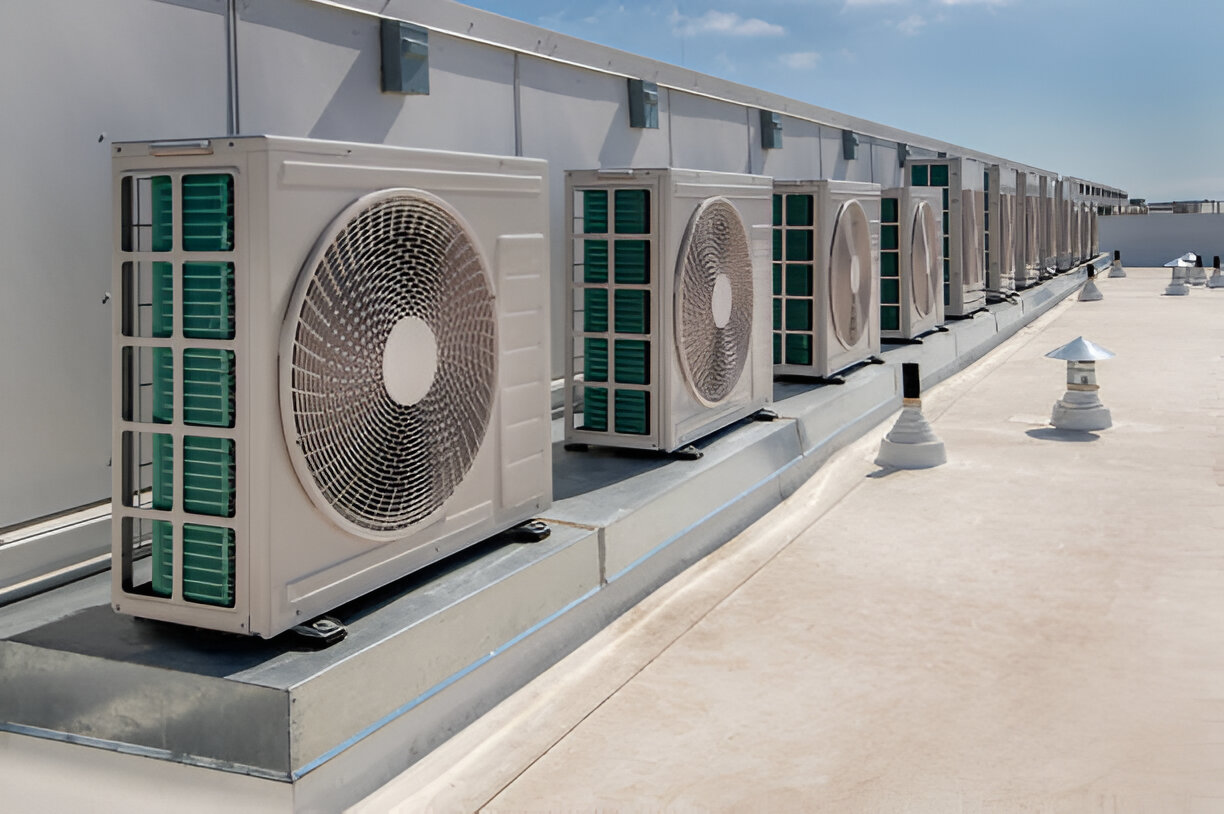Commercial HVAC Services in West Houston, TX
Commercial HVAC Services in West Houston, TX
Commercial HVAC performance is critical to keeping West Houston businesses productive, comfortable, and code-compliant. With hot, humid summers, frequent storms, and a diverse mix of retail, office, and industrial properties, West Houston buildings face unique HVAC demands.

Why focused commercial HVAC matters in West Houston, TX
West Houston experiences extended cooling seasons and high humidity that stress cooling systems and indoor air quality controls. Rooftop packaged units, common in local shopping centers and warehouses, are exposed to heat, UV, and storm damage. Timely maintenance, robust controls, and code-aware installations reduce downtime, lower energy costs, and help ensure occupant comfort during peak demand. For businesses, HVAC reliability directly affects operations, employee productivity, tenant retention, and regulatory compliance.
Core commercial HVAC services offered
- Rooftop unit (RTU) and packaged system service: diagnostics, coil cleaning, refrigerant leak detection and repair, motor and compressor servicing, rooftop curb and flashing checks.
- Preventative maintenance contracts: scheduled inspections, seasonal tune-ups, filter and belt replacements, performance reporting, and priority scheduling.
- Commercial system design and installation: load calculations, duct and ventilation design, selection of RTUs, packaged systems, split systems, and integration with building automation.
- Code compliance and permits: plan reviews, permit coordination, equipment specification to meet local and state code requirements, and support for inspection processes.
- Energy management and retrofit projects: energy audits, controls upgrades, economizers, VFDs, smart thermostats, and phased retrofit planning to improve efficiency and ROI.
- Emergency response for businesses: rapid dispatching for system failures, temporary cooling/heating solutions, and on-site triage to restore critical operations.
- Service level agreements (SLAs): documented response times, prioritized service tiers, reporting, and uptime targets tailored to business needs.
Common commercial HVAC issues in West Houston and why they happen
- Frequent compressor and condenser failures: caused by high operating loads during long cooling seasons and dirty coils from urban pollutants.
- Refrigerant leaks and reduced capacity: older systems with degraded seals and frequent cycling lead to leaks that reduce cooling power and increase energy use.
- Poor indoor air quality and humidity control: high outdoor humidity challenges dehumidification capacity, making humidity control essential for occupant comfort and product storage.
- Rooftop unit weather damage: storm-driven debris, wind uplift, and water intrusion impact rooftop equipment and curbs.
- Control and automation inefficiencies: outdated controls run equipment inefficiently or fail to adapt to varying occupancy patterns common in commercial spaces.
Diagnostic approach and service process
- Initial assessment: visual inspection of equipment, airflow measurement, refrigerant pressure checks, and review of control settings and maintenance history.
- Performance testing: load testing, temperature differentials, motor amperage checks, and air balancing to verify system capacity.
- Root cause analysis: identify whether failures stem from component wear, design shortcomings, airflow restrictions, or control programming.
- Repair or retrofit recommendations: prioritize actions by urgency, operational impact, and cost-effectiveness. Recommendations include parts replacement, control updates, and staged retrofit plans.
- Documentation and follow-up: clear service reports, parts lists, and recommendations for preventative steps to avoid repeat issues.
Commercial installation and retrofit best practices
- Begin with accurate load calculations and a thorough building envelope review to size equipment correctly.
- Prefer modular and scalable systems for phased retrofits to limit disruption to operations.
- Integrate energy management controls and submeters during installation to capture performance data from day one.
- Specify corrosion-resistant components and weatherproof curbs for rooftop equipment in West Houston’s humid, coastal-influenced climate.
- Plan for duct sealing and insulation upgrades to recover lost cooling capacity and improve comfort consistency.
Energy management and retrofit strategies that deliver savings
- Conduct a detailed energy audit to identify high-impact measures such as economizers, VFD installation on air handlers, and optimized setpoints.
- Use scheduling, occupancy-based controls, and demand-limiting strategies to reduce peak loads during expensive summer hours.
- Implement monitoring and analytics through building automation systems to detect inefficiencies early and verify retrofit performance.
- Phase projects to match budget constraints while targeting short payback measures first, such as lighting and control upgrades that reduce HVAC load.
Emergency response and service level agreements (SLAs)
- SLAs for commercial clients typically define response windows by priority: critical failures affecting operations vs. noncritical comfort calls.
- Emergency response services for West Houston businesses include expedited dispatch, temporary cooling/heating solutions, and coordinated repairs to minimize downtime after storms or unexpected failures.
- SLAs often include scheduled preventative maintenance visits, reporting frequency, parts availability guarantees, and performance benchmarks to ensure predictable system reliability.
Maintenance tips and long-term benefits
- Maintain scheduled filter, belt, and coil cleaning cycles to preserve efficiency and avoid premature component failures.
- Monitor refrigerant levels and repair leaks promptly to prevent capacity loss and compressor stress.
- Keep rooftop areas clear of debris and ensure curbs and flashings are watertight to protect equipment during storms.
- Adopt a preventative maintenance contract to lock in priority scheduling, predictable budgeting, and reduced emergency repairs.
Timely, code-compliant commercial HVAC service in West Houston reduces operating risk, improves energy performance, and protects occupant comfort through extreme summer conditions and storm seasons. Well-designed maintenance plans, strategic retrofits, and responsive SLAs are the elements that keep businesses running smoothly and affordably in this regional climate.
Customer Testimonials
Our customers praise our exceptional service and attention to detail, consistently exceeding expectations.































































